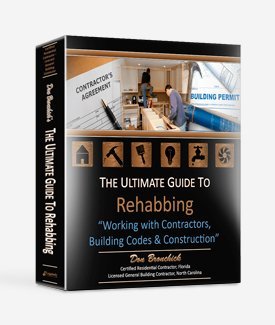Getting a solid referral is the most obvious and easiest way to find contractors. In your search for a good contractor, start by trying to secure referrals from investors and friends. You want somebody you know and trust who has had a positive experience with a particular contractor. That in itself is worth a lot! Don’t just accept an endorsement such as “He was really good, I’d use him again.” Your investor friend is basically saying, “If he was good enough for me, then he’s good enough for you.” Honestly, there is much more to it than that. How well do you know the other investor? What are their standards for a project? Do they meet or exceed your standards? What if they did not do their due diligence on the contractor? What if the contractor did a great job for them, but was not licensed and or insured, and thus did not pull permits where required?
Bottom line; you need to ask your investor friend some questions when they give you a referral:
- Is the contractor licensed and insured?
- Did they pull permits where required?
- Did they start on time?
- Was the job completed on time?
- Were there cost overruns?
- Did you have to chase them at the end to clean up and do the punch list items?
- Were there any mechanic’s liens attempted/placed?
- Did they ever suggest a less expensive manner to complete the job?
This last question is a very important question. Give me two apparently equal contractors, and if one has suggested a way to save me money on the job (known in the industry as “Value Engineering”), they likely have some ethics and would likely get my business. It also shows that they intend on working for you again, not merely looking to hit a home-run on this one job.
State/county license databases are another good option for finding contractors. If it is a larger municipality, they likely have online contractor license databases where you can actually go in and search given parameters. In some cases there may be a particular license category you are seeking, say a roofer or plumber. This resource can also allow you to do your own due diligence on a particular contractor and check to see if they indeed hold a license that is active and in good standing. While this approach will do nothing to verify a contractor’s performance history and insurance qualifications, it will alert you as to whether or not they have a valid license that is active and in good standing.
Licensing. Another “need to know” is that licensing requirements vary a great deal from county to county and state to state. For example, in Florida and North Carolina, only the state can issue a General Contractor license. In New York and Colorado, a GC license may only be obtained from a county or in some cases, a local municipality. Florida and California have an astounding number (dozens!) of general and specialty contractor of general and specialty contractor licenses, issued only at the state level. Some other states like Ohio and Missouri issue no state contractor licenses whatsoever. Many states have no GC requirements but most do for electrical, plumbing and asbestos abatement. Do your homework before hiring your contractor(s).
Insurance. You want to be sure anybody you choose has the appropriate insurance coverage, specifically general liability and workers compensation.
New Home Builders- Great Resource. New-home builders are sticklers for verifying policies for accuracy, as well as being in force. If they’re active on the job site, their insurance is active too. Many builders, for security reasons, demand all contractor vehicles be signed while on the job site.
This makes it especially easy for you to write down names and numbers to call. Better than the phone book! Don’t be shy about jumping out of your vehicle and approaching a worker and asking the company’s name and who you should ask for.
Builders are so consumed with meeting construction build cycle-times that they rarely hire a contractor working out of his garage. They want to hire a qualified business entity, not a guy in a pickup truck. This is what you want as well. If you hire a guy in a pickup truck because he is the
low bid, I can hear it now: “Sorry I cannot get out to your house today, my guys are sick.” C’mon, you can do better!
Homebuilders’ Association Directories. Yet another resource you might want to look at is the homebuilder’s association directories. The National Association of Homebuilders (NAHB) has state chapters; every state has one. If you go online (www.nahb.com) and do a search for your particular state you will be able to identify your state or more importantly local chapters; your county, region or even a city chapter if it is a larger metro area. Known as HBA’s (homebuilders associations), they often maintain searchable (to the public) member directories on their websites.
The Bottom line; Run your rehab business like a business, and hire professionals.
Get the Ultimate Guide to Rehabbing abd Learn
How to Prevent Getting Screwed by a Contractor!
Free eBook: Wholesaling for Quick Cash Profits
Download this FREE eBook, "Wholesaling for Quick Cash Profits". It will show you how to find, analyze, negotiate and flip wholesale deals to other investors for fast cash profits. Learn the legalities of wholesaling, common mistakes investors make, and how to get started in the wholesaling business!


